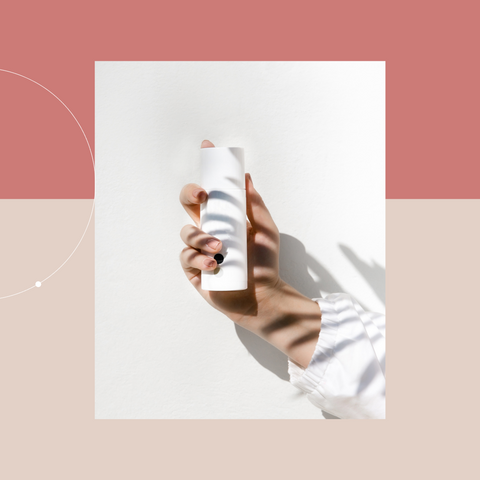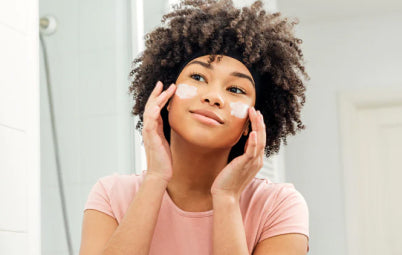Wondering what the difference is between retinol and retinoids? And which one would win in a head-to-head? We’ve got the answers, right here.
You might have seen terms like tretinoin mentioned in the skincare world, or you’re wondering about retinol suitability for your skin type, or asking why we recommend some ingredients over others — whatever questions you have, we’re going into detail on these two super effective ingredients and what they could do for your skin.
From retinol side effects to how to use both, let’s take a look at retinols vs retinoids.
Keen to speak to a professional about whether retinols or retinoids are for you? Book a free video consultation with one of our Skin Experts:
Here’s what we’ll cover in this article:
- What are retinoids and where do they come from?
- What is retinol and where does it come from?
- What do they do for skin?
- What’s the difference?
- What are the side effects of retinol and retinoids?
- How do you use retinol and retinoids?
- Who would benefit from using retinol?
- Who would benefit most from using other types of retinoids?
- What retinoid-based products does Face Dr recommend?
- Summary: Should I try retinol or retinoids?
What are retinoids and where to they come from?

The term retinoid is a sort of catch-all name for a few different vitamin A-based ingredients used in skincare, such as retinol, retinyl palmitate, retinoic acid and more. You will mostly have heard the terms retinoid and retinol before when referring to skincare, as they are effective at improving skin ageing, uneven skin tone, texture and pigmentation.
Retinoids have been found to work deep in the dermis skin layer to boost skin cell turnover and stimulate collagen and elastin production, so they are popular anti-ageing ingredients as they help reduce the signs of ageing over time. Some retinoids are also used in acne treatments as they can unclog pores and reduce the inflammation that causes spots.
They are often used in stronger formulations of prescription products, and the strongest retinoids — such as tretinoin — are only available as prescription products because they contain a higher concentration of retinoic acid and can lead to side effects we’ll cover later.
Various types of retinoids have been found to be effective in different areas. For example:
- Tretinoin - Most commonly used for clearing troublesome acne
- Retinol - Known to improve skin texture, hyperpigmentation, dryness and fine lines
- Retinal - Retinal (with an A) can also improve the appearance of fine lines and is less irritating on skin, but is thought to be less effective than other retinoids
- Retinyl esters - These include the likes of retinyl acetate and palmitate, and similarly to retinal they have less anti-ageing effectiveness when compared with others
- Tazarotene - This synthetic retinoid can be applied topically to help with psoriasis, acne and hyperpigmentation
What do retinoids do for your skin?

Overall, retinoid treatments can be very effective. In one study, participants used retinoic acid and retinol treatments for 4 weeks and had their facial image analysis taken. The results showed an increase in epidermal thickness and collagen production, and after 12 weeks participants noticed a significant reduction in wrinkles.
Your Skin Expert may recommend a specific concentration depending on the skin issues you are trying to treat, but these ingredients have both been found to help reduce various skin issues such as:
- Fine lines, wrinkles, and other signs of ageing
- Acne and past acne scarring
- Melasma, dark spots, and other types of hyperpigmentation
- Sun damaged skin, like sun spots
- The appearance of large pores
- Uneven skin texture or tone
- Stretch marks
- Psoriasis
How Retinol compares with other Retinoids
In a nutshell, retinol and retinoid products create the same results, but the two can be compared like this. Retinol can be available on the high street and over the counter, whereas other types of retinol are prescription only. Retinol can be slower to take affect than retinoic acid, for example, and is a slow builder on the skin. However, Retinol is more suitable for sensitive skin for this reason.
What are the side effects of retinoids?

When it comes to side effects, it’s important to know both retinol and retinoids can produce some mild to moderate side effects, although these are typically more of an issue with retinoids because they are used in stronger concentrations. These usually only last a few weeks but can include:
- Skin irritation and redness
- Dryness, skin peeling or flaking
- Itching or burning
- A higher risk of sun damage
Although you probably won’t experience all of the above, you may notice some of these common side effects when you start using retinol or retinoids as your skin adjusts over 2-4 weeks. If you are worried about side effects, or experience some you would like to make sure are normal, you can speak to one of our Skin Experts at any time so they can adjust the concentration of your product if needed.
How do you use retinol?
When you first start using a retinol or retinoid product, your Skin Expert will likely recommend you adjust the volume of product you apply, so perhaps start with one pump and build up to 2 or 3 as your skin gets used to it. This way side effects may not be so severe and you will be more likely to carry on using the product for the 6+ weeks it usually takes to start seeing results.
You will also need to add a hydrating product to your routine to counteract any skin peeling and irritation that can happen when using retinoid-based products. Your Skin Expert can help recommend one, and you can watch Dr Julia’s video on hydrators and retinol use here.
Lastly, a broad spectrum sunscreen is a must as retinol and retinoids are known to make skin more sensitive to sun. Pop on SPF 30 or higher to protect skin and avoid sun damage.
Who would benefit most from using Retinol?

If you are happy to commit to long-term use, retinol can be effective on many skin types:
- Anyone with mild to moderate acne looking to calm skin, unclog pores and fade previous acne scars
- Anyone with melasma, sun spots and other types of hyperpigmentation looking for a more even skin tone over time
- Anyone with signs of ageing skin, such as thin skin, fine lines and wrinkles looking to smooth lines and tighten skin over time
Remember, if you have sensitive skin you may be best starting with retinol, but speak to your Skin Expert to find out the best formulation for your skin needs.
Who would benefit most from using another type of retinoid?
Many other retinoids can be a game-changer for more severe skin issues, and typically create results faster than retinol. Those who might benefit from retinoids include:
- Anyone with more intense acne looking to calm this and reduce the severity
- Anyone with more noticeable signs of ageing skin, such as thin skin, fine lines and wrinkles, looking to smooth and tighten
What retinoid-based products do we recommend?

At Face Dr, our Skin Experts can prescribe a number of fantastic products to help you see results, and our clients have experienced these dramatic, positive changes in their skin. As retinoid-based products can be strong, we sometimes recommend people start with retinol in order to see the long-term benefits of this ingredient without any of the harsh side effects.
The ZO Retinol Skin Brightener is one of our most popular products and our clients continue to come back again and again to replenish their supply. This product is available in concentrations of 1%, 0.5% or 0.25% retinol.
We also offer Obagi Retinol 0.5 and Retinol 1.0 options for those looking for Obagi Medical retinol products.
If acne is a concern, you may instead be recommended a tretinoin product, which is a prescription-only medicine. You can read more about this ingredient in our article; What is Tretinoin and how does it work?
Your Skin Expert can advise on the ideal product and percentage you need for your skin concern to help you get the best results out of your new skincare routine.
Summary: Should I try Retinol or an alternative Retinoid?

Deciding whether or not to commit to a retinoid-based skincare routine can feel a little confusing with all the different types of retinoid and percentages available, but remember you don’t have to choose the right product on your own.
In fact, working with one of our Skin Experts can help you understand what you are applying to your skin, work through any side effects, adjust the percentages if needed, and avoid you purchasing products too mild or harsh for your skin type that would eventually go to waste.
Ready for expert advice on all things retinoids and retinol? Click here:
Want to read more from our blog? Here are some articles that may interest you:











